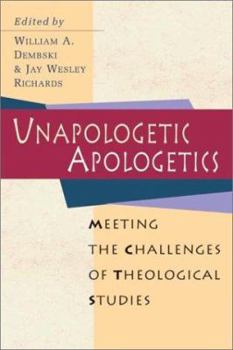Unapologetic Apologetics: Exploring the Hermeneutics of Cultural Analysis
Select Format
Select Condition 
Book Overview
As objective truth has come under suspicion in theological study during recent years, scholars and students have also begun to take less seriously the task of persuading others to believe. Apologetics has been neglected, misunderstood and misrepresented. Unwilling to accept this new status quo, editors William Dembski and Jay Wesley Richards, along with their team of expert contributors, firmly hold that apologetics once again deserves our attention...
Format:Paperback
Language:English
ISBN:0830815635
ISBN13:9780830815630
Release Date:January 2001
Publisher:IVP Academic
Length:280 Pages
Weight:0.85 lbs.
Dimensions:0.8" x 6.0" x 9.0"
Customer Reviews
5 ratings
An eye opener
Published by Thriftbooks.com User , 16 years ago
I have only read sections of this book, which is not in my major area of interest, but found the following of much interest. When William Dembski attempted to reactivate interest in the field of apologetics at Princeton Theological Seminary, including support for Intelligent Design and a critique of Darwinism, he faced two lawsuits, and was "threatened with physical violence, accused of racism and sexism, denied funding that other campus groups readily received, had posted signs destroyed and removed, and were explicitly informed by faculty that membership in the Charles Hodge Society [set up to study apologetics] jeopardized their academic advancement" (p. 26). Princeton dropped their apologetics requirement in 1943 and in 1944 it was no longer offered even as an elective. One wonders if this is one reason for the decline of liberal Protestantism and the growth of the so-called conservative churches.
Superb apologetic resource
Published by Thriftbooks.com User , 22 years ago
While the discipline of apologetics has fallen into disuse and disfavor among mainline scholars who have subscribed to a more pluralistic philosophy, this intrepid group of Princeton alumni battle to keep that old apologetic spirit, so integral to "Old Princeton", alive and well. They succeed admirably. Many issues are tackled in this book, especially naturalism and the effect it has had on biblical and theological studies. The book reads like a conservative theological journal, and, believe me, I would be thrilled to see more books from this group on the market. Every person preparing to enter seminary or study religion in a college setting should read this book and keep it handy for research purposes. Although some subjects could have been developed further (the chapter on universalism ended much too soon), all in all it is an outstanding resource.
A Must Read
Published by Thriftbooks.com User , 23 years ago
I have not read every essay in this book (yet:) but so far I've been more than impressed and highly recommend this book to anyone interested in a refreshing and thought-provoking look at apologetic issues that face the Christian church. This isn't a Josh McDowell "an ancient scroll has been found in a cave proving that Christ is real" text book. The essays in this book, however, cover a broad range of topics and will help clear up confusion surronding so many troublesome issues. From Cannata's excellent essay on "The History of Apologetics at Princeton Seminary" to Dembski's "The Problem of Error In Scripture," you simply can not afford to wait any longer to purchase this must-read book.
challenges the old, rehashed status quo
Published by Thriftbooks.com User , 23 years ago
As a graduate of Yale Divinity School, I relished most of what I read in this book. There are real limits to what only one volume can accomplish. Yet this book will be for many seminarians the beginning of a discussion that will free them from the staid "orthodoxy" that is straitjacketing most mainline Protestant seminaries and strangling the life out of the mainline Protestant denominations. This "orthodoxy"--that spurns and subtly (and sometimes not so subtly) chastises conservative evangelicals, as well as traditional Anglicans, Catholics, and Eastern Orthodox--often surpasses the uniformity and conformity found in fundamentalist institutions. Dembski and Richards's plan of how traditional Christian students can be anti-establishment and counter the reigning orthodoxies of contemporary theology, without being triumphalistic or imperialistic, is exciting and will go far in renewing vibrant theological discourse on the campuses of mainline divinity schools, much of which is already going on at places like Yale, which for more than a decade has been actively recruiting evangelical students and faculty members. I hope that this book gains wide currency among young men and women in seminary.
Priceless help for the confused student
Published by Thriftbooks.com User , 23 years ago
As a former student at a mainline theological seminary, I can attest to the fact that Dembski and Richards have described the atmosphere of such institutions with depressing accuracy. But this is not a book that complains about the sad state of theological education. Dembski and Richards provide a plan for what students can do to stem the tide of secularism and heterodoxy in religious schools. They and the other contributors offer a number of essays on timely themes, which carefully dissect unjustifiable assumptions in a variety of areas. Their approach exemplifies their conviction that the best solution to bad ideas isn't quarantine or overexposure, but inoculation. If you know Christian students who are struggling with intellectual assaults on their faith, even if they attend a "conservative" school, you should buy them this book.




